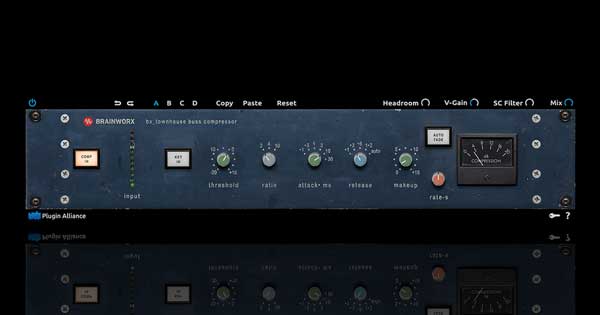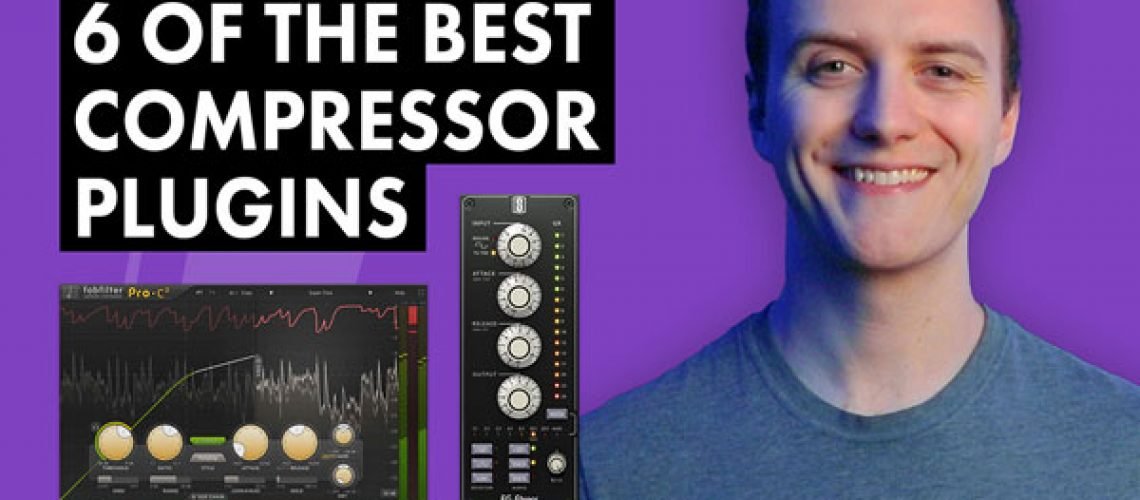Learn about the best compressors for general use, multiband processing, vocals, drums, and your master buss.
Compressors reduce the dynamic range of audio signals. Various types of compressors exist, each applying compression using different methods. With a more extensive library of compressors, you’ll be able to achieve a wider variety of sounds. We’ll be taking a look at 6 of the best compressor plugins on the market.
Whether you require a compressor for general use, multiband processing, vocals, drums, or your master buss, the following list has what you’re looking for. Specific characteristics make some compressors more adept for particular tasks than others. This may include the features they provide access to, such as mid/side processing, or the tone they apply to the audio signal you’re affecting.
Want to learn more about how compressors work? Read “The Ultimate Guide to Compression” to learn how to use a compressor, and master one of the most coveted audio engineering tools. Let’s dive into the following list and see which plugin compressors made the cut.

If you’re looking to upgrade from your digital audio workstation’s stock compressor, the FabFilter Pro-C 2 is a versatile option. It provides 8 different compression algorithms that include Clean, Classic, Opto, Vocal, Mastering, Bus, Punch, and Pumping. Each algorithm provides a unique style of compression, so the Pro-C 2 is like 8 compressors in one.
FabFilter has included all the features you could wish for in a digital plugin compressor. The Pro-C 2 includes a sidechain EQ section with customizable high-pass and low-pass filters, plus an additional freely adjustable filter. There’s an Audition button that solos audio triggering the compressor, a Mix setting that scales the gain change from 0% to 200%, smooth lookahead up to 20 ms, up to 4x oversampling, a custom knee, and loudness level meters.
When I’m looking for a reliable compressor that will undoubtedly perform well, I reach for FabFilter’s Pro-C 2. It’s the Frank’s RedHot of compressors and sounds good on just about anything. If you can only afford one compressor, get the FabFilter Pro-C 2.

Multiband compressors allow you to compress specific frequency ranges independent of one another. They’re similar to dynamic EQs, but there is a difference between dynamic EQs and multiband compressors. At a mastering level, multiband compressors are extremely useful. They allow you to target specific groups of sounds and compress them as necessary.
You can use a multiband compressor as a de-esser, to compress just the 6-8 kHz range of a vocal. This allows you to tame harsh sibilant sounds like “Sss” and “Shh.” Pop filters do more to help with plosives than they do sibilance, so getting a dedicated de-esser like the one found in Accusonus’ ERA Bundle is something to consider as well.
Perhaps you’re mastering a song, and the entire track sounds good, but every time the kick hits around 160 Hz, it’s too punchy. If you set a band’s center frequency to 160 Hz and apply peak compression to the transient kick, you’ll be able to tuck it into the mix. Alternatively, you can apply compression in a way that highlights transients, making the kick even punchier.
iZotope’s Multiband Dynamics plugin allows you to apply multiband compression to the center and sides of your stereo image independent of one another. It lets you choose from peak detection, envelope detection, and RMS detection mode, which significantly changes how the compressor responds to the input signal. There’s also a solo and bypass button for each band.
Much like FabFilter’s Pro-C 2, iZotope Ozone’s Dynamics plugin puts a great emphasis on the power of digital processing. One of the most exciting features of this compressor is the button that matches effective gain when the plugin is bypassed; this allows you to make well-informed mixing and mastering decisions without worrying about loudness bias.
This plugin comes as a module within iZotope’s Ozone 8 Standard bundle ($249), or as its own plugin as part of iZotope’s Ozone 8 Advanced bundle ($499). Both of these bundles include an entire suite of mastering tools that are well worth the investment.

The CLA-76 is the first analog modeled plugin compressor on this list. While Waves doesn’t explicitly say this on their website, the plugin is meant to emulate a classic 1176 compressor/limiter of the mid-60s. Known for having a speedy attack time, the CLA-76 is ideal for peak compression and tracking tight pop and EDM vocals.
This compressor has a natural and musical character. Digital compressors tend to perform linear processing in a way that doesn’t always “feel” great, so the nuances and unique forms of compression applied by analog-modeled compressors can be quite desirable.
The specific components used in analog compressors, and the order in which the components are arranged play a role in how analog compressors sound. For example, the CLA-76 comes in both a “Blue” and “Blackey” version; each with their own unique sound. The main differences between the two compressors are different gain stages, time constants, total harmonic distortion (THD), and noise levels.
Many engineers like using the CLA-76 on their drum buss. If you engage All-Ratio-Buttons-In mode, you recreate what would happen if you were to change the bias of the FET component in the original analog unit; enabling this mode sounds great when using the CLA-76 to apply parallel compression.

Slate Digital’s FG-Stress aims to emulate Empirical Labs’ EL8 Distressor. The analog counterpart of this plugin is often recommended as the first outboard compressor audio engineers should buy due to how versatile it is. It changes character with each ratio, and is capable of mimicking punchy VCA compressors, fat tube compressors, and vintage opto units.
The aggressive style of compression that FG-Stress is capable of providing lends itself very well to rock and rap vocals. FG-Stress’ sound can be refined using different detection circuits, which further changes the compressor’s tone. Additionally, various audio path options allow you to add color and warmth to the compressor’s input signal. In moderation, FG-Stress can do wonders on bass guitar, and when cranked up, it can slam stacks of guitars together.
I think you’ll be hard pressed to make the distinction between Slate Digital’s FG-Stress and the analog units it’s modeled after. This plugin comes as part of Slate Digital’s All Access Pass, which includes an entire suite of plugins and production master classes for just $14.99/month. I highly recommend this pass if you like analog modeled plugins. The fact that it includes production master classes is just a bonus.

The studio engineers from London’s Townhouse Studios built a unique buss compressor in 1978 using Solid State Logic (SSL) components. The exciting thing about this unit is that it wasn’t part of a mixing desk. At the time, external console buss compressors weren’t something available for purchase. Brainworx has modeled this vibey analog compressor and delivered it in the form of a smooth riding plugin compressor via Plugin Alliance.
If you own other SSL style buss compressors, you’ll be pleasantly surprised when you hear Brainworx’ bx_townhouse in action. The sound it provides is reminiscent of a G Buss compressor; snappy and shiny. However, the neat thing is that it sounds a bit warmer and punchier than most SSL style buss compressors.
I find myself using bx_townhouse generously on instrument and vocal busses, but it’s not as often that I use it for mastering purposes. For my clients that are looking for “transparent” masters, bx_townhouse usually comes across too strong. On the other hand, some clients want me to provide their music with a lick of color. In these situations, I’ll absolutely reach for bx_townhouse.
Plugins Alliance sells another compressor called the Vertigo VSC-2, which provides even more dirt, grit, and warmth than bx_townhouse. It’s not quite as snappy and punchy as bx_townhouse, but that may not be what you’re looking for. The VSC-2 is a VCA compressor that mellows out most sounds and provides an unmatched level of rich tonality. If the VSC-2 were a person, it would be your friend with an over-the-top personality.

I can’t think of a more iconic and popular master buss compressor than the Waves SSL G-Master Buss Compressor. It’s based on the center compressor of the SL 4000 G console and aims to recreate the sound of the original unit’s IC input and twin VCA gain-reduction amplifier design.
Punchy, snappy, and bright are how I would describe the SSL G-Master Buss Compressor. You can use it to tighten up final mixes while preserving transient material. I typically use this compressor either to apply peak compression without killing transients or to highlight transients by using a slow attack and fast release time; this causes the compressor to clamp down on the tail end of transients briefly and “glue” my masters together.
Make sure to follow Black Ghost Audio on Facebook, Twitter, Instagram, and YouTube to stay up to date on the latest music production tips and tricks. There’s new content every week, and I don’t want you to miss out.




